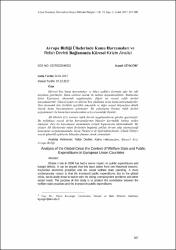| dc.contributor.author | GÜNGÖR, Kamil | |
| dc.date.accessioned | 2019-05-15T06:51:33Z | |
| dc.date.available | 2019-05-15T06:51:33Z | |
| dc.date.issued | 2017-12 | |
| dc.identifier.uri | https://sbd.aku.edu.tr/wp-content/uploads/2017/12/C.19-S2b14kamilgungor.pdf | |
| dc.identifier.uri | http://hdl.handle.net/11630/5803 | |
| dc.description | Global crisis in 2008 has had a severe impact on public expenditures and
budget deficits. It can be argued that this issue arises from two historical reasons:
Keynesian economic practices and the social welfare state spending. A more
contemporary reason is that the increased public expenditures due to the global
crisis, particularly those to tackle with the rising unemployment problems and other
social needs. The purpose of this study is to analyze the correlation between the
welfare state practices and the increase in public expenditures.
EU countries have revised their welfare state practices after the crisis as a
result of the pressures on their public budgets because these practices have negative
effects on productivity of national economies. This has triggered the question of
whether European countries can still afford their traditional welfare state practices.
The issue also concerns Turkey since it finances its social security deficits from the
budget | en_US |
| dc.description.abstract | Küresel kriz kamu harcamaları ve bütçe açıkları üzerinde ağır bir etki
meydana getirmiştir. Bunu tarihsel olarak iki nedene dayandırabiliriz. Bunlardan
birisi Keynezyen ekonomik uygulamalar, diğeri ise sosyal refah devleti
harcamalarıdır. Güncel neden ise küresel kriz yüzünden artan kamu harcamalarıdır.
Zira ekonomik kriz özellikle işsizlikle mücadele ve diğer sosyal ihtiyaçlara dönük
olarak kamu harcamalarını artırmıştır. Bu çalışmanın konusu refah devleti
uygulamaları ile kamu harcamalarındaki artış arasındaki ilişkidir.
AB ülkeleri kriz sonrası refah devleti uygulamalarını gözden geçirmiştir.
Bu politikaya sosyal devlet harcamalarının bütçeler üzerindeki baskısı neden
olmuştur. Zira bu harcamalar ekonominin verimli kapasitesini etkilemektedir. Bu
yüzden AB ülkelerinde refah devletinin bugünkü şekilde devam edip edemeyeceği
konusunun sorgulanmaktadır. Konu Türkiye'yi de ilgilendirmektedir. Çünkü Türkiye
sosyal güvenlik açıklarını bütçeden finanse etmek zorundadır. | en_US |
| dc.language.iso | tur | en_US |
| dc.identifier.doi | | en_US |
| dc.rights | info:eu-repo/semantics/openAccess | en_US |
| dc.subject | Refah Devleti, Kamu Harcamaları, Küresel Kriz, Avrupa Birliği | en_US |
| dc.title | Avrupa Birliği Ülkelerinde Kamu Harcamaları ve Refah Devleti Bağlamında Küresel Krizin Analizi | en_US |
| dc.title.alternative | Analysis of the Global Crisis the Context of Welfare State and Public Expenditures in European Union Countries | en_US |
| dc.type | article | en_US |
| dc.relation.journal | Sosyal Bilimler Dergisi | en_US |
| dc.department | Afyon Kocatepe Üniversitesi | en_US |
| dc.identifier.volume | 19 | en_US |
| dc.identifier.startpage | 267 | en_US |
| dc.identifier.endpage | 285 | en_US |
| dc.identifier.issue | 2 | en_US |
| dc.relation.publicationcategory | Makale - Uluslararası Hakemli Dergi - Kurum Yayını | en_US |



















